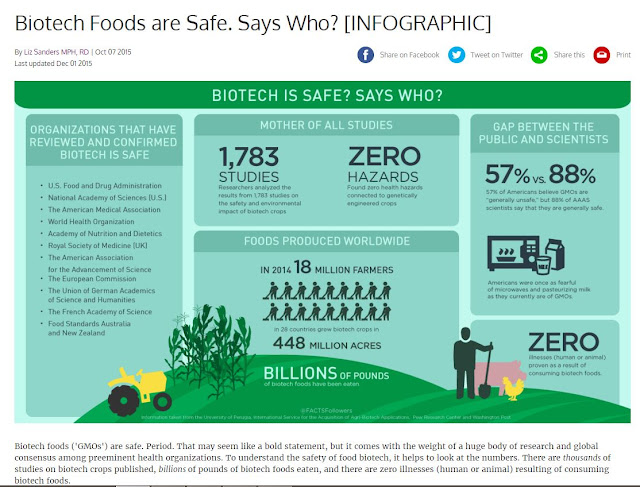I love scouting. It is a wonderful program designed to teach kids valuable skills and develop them into leaders. I have two boys that actively participate in cub scouts and I have enjoyed being a den leader as well as going through the ranks of boy scouts when I was a kid. However I have not had much experience with girl scouts. I have a daughter, but she is still too little to be involved. That does not keep me from buying the infamous girl scout cookies when they come knocking on the door.
 |
| http://www.abcsmartcookies.com/thin-mints |
So what do GMOs and the Girl Scouts have in common? Well, my respect for the organization grew even more when I started fact checking the connection myself. The truth is those girl scout cookies that I love so much are made with GMO ingredients and the Girl Scouts have not changed that stance even with pressure to do so.
The cookies use GMO ingredients but there has been plenty of pressure to switch to all non-GMO ingredients. A petition was started in 2013 by a girl scout to get the Girl Scout organization to stop using GMO ingredients. The Facebook page is still going strong and the petition has over 47,000 signatures.
I was hunting for the reason why the girl scouts are being petitioned to remove GMO ingredients and found the letter describing the anti-GMO position.
This letter sums up the information war that sadly anti-GMO groups are winning and the misconceptions that the industry is having a hard time changing. Let's look at this letter in depth.
1. "If Girl Scouts continues to make cookies with GMO ingredients, our soil will continue to be saturated with pesticides"
GMOs in many cases help decrease the use of pesticides. Quoted right from the publication Science, "Overall pesticide use on U.S. farms dropped 0.6% a year from 1980 to 2007." Bt corn is a prime example of a product whereby insect eat the plant and die so less pesticides need to be applied.
 |
| http://www.sciencemag.org/site/special/pesticides/infographic.xhtml |
2. "Our Farmer’s will continue to pay higher prices for seeds and purchase larger quantities of pesticides."
It is easy to say farmer's pay a higher cost for GMO seed, becuse at face value that is correct. However farmers are more than willing to pay a higher cost for GMO seed because the yields and thus the profits are higher. I really encourage you to read this article: https://gmoanswers.com/ask/what-difference-cost-production-gmo-vs-non-gmo
I can summarize just a small part of this issue from that link.
A farmer in Maryland has grown GM and Non-GM corn and soy and run the numbers.
GMO seed does indeed cost more. There are research costs associated with new technology. A lot of scientists put in hard work and time to bring a better solution to the farmers. However look at the gains. Income per acre is much higher because the GM solution provides higher yield. Delve into the article for even more comparisons and perspective. Even more important, talk to farmers about GMOs and see what they use and think. Get their perspective and you may be surprised that most farmers want new biotech solutions if it means higher yields.
3. "Our bees will continue to die off."
There is no dispute that bees are dying off. The issue is complicated because there is not just one thing killing the bees. Instead there are many factors and they are all coming together. Climate change and the parasitic varroa mite are all part of the issue. Certain pesticides if not applied properly can kill bees. And now hot off the press is more research that was just published in Science that shows a virus called the deformed wing virus may be part of the problem too. We know the varroa mite can pick up viruses from the bees blood and transmit it to other bees. If the varroa mite and deformed wing virus are in the same hive the results are dead bees and estimates are that the two have joined to kill millions of bees. Bee death is a challenge we must solve, but no where in this discussion is anything about GMOs killing bees. In fact GMOs may be a tool to help protect bees from insecticide use. If less insecticides are used due to GM technology there is less risk that insecticides are used improperly and will kill bees.
Take a read on the new science: http://www.ibtimes.co.uk/bee-decline-two-diseases-are-combining-destroy-global-honey-bees-1547415
4. "In eating the cookies we will continue to gamble with our health."
I have shown and talked about GMO safety in many previous blog entries. Take a look back at the science. This info graphic sums up safety quite well. GM food is safe and we have the science to prove it!
 |
| http://www.foodinsight.org/biotechnology-gmo-food-safe-who-infographic |
5. "Please research GMOs thoroughly and understand no long-term studies have been done."
Yes, please really research GMOs including the "1783" studies that have looked at safety. Research the benefits including higher yields and less pesticide use. Research projects like Golden Rice (GMO rice with increased vitamin A) and the humanitarian efforts that GMO crops can provide the world. Talk to farmers and get their perspective. Talk to scientists doing this work over dinner and see that they are trying to make a difference. There is no corporate conspiracies. We love science, we love agriculture and we want to provide farmers with a tool to help feed people.
In the end the Girl Scouts did do their research and listened to the science instead of the fear. Their stance is listed on the Girl Scout website. So when the Girl Scouts come to my house next time I might just have to buy a few extra boxes.
 |
| http://www.girlscouts.org/en/cookies/all-about-cookies/FAQs.html |





No comments:
Post a Comment